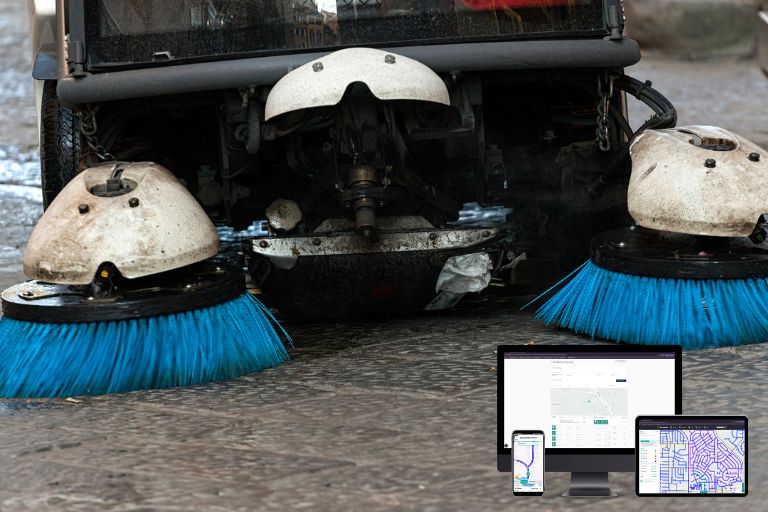Blog
Smart Streets: How Modern Street Sweeping Keeps Cities Clean, Safe, and Sustainable
by Routeware Team • October 6, 2025

The Unsung Hero of Urban Cleanliness
Every city has its shining stars—parks, downtown corridors, public art—but one of the most important contributors to livable, beautiful communities often goes unnoticed: street sweeping.
Street sweeping is more than a cosmetic service. It’s an essential part of maintaining public health, environmental safety, and city pride. By clearing debris, pollutants, and litter, sweeping protects storm drains, reduces flooding, improves air quality, and helps municipalities meet environmental compliance standards.
And yet, many cities still rely on outdated schedules, paper-based tracking, and manual reporting. That’s where modern technology is changing the game.
Why Street Sweeping Matters More Than Ever
For municipal leaders, the impact of street sweeping extends far beyond clean curbs. Here’s what’s at stake:
1. Environmental Protection
Street sweepers are the first line of defense against pollution entering local waterways. By capturing oil residues, trash, and microplastics before they reach storm drains, cities protect ecosystems and maintain compliance with environmental regulations.
2. Public Safety and Health
Debris and gravel on roadways can cause accidents and contribute to poor air quality. Consistent sweeping reduces respiratory irritants and keeps streets safer for drivers, cyclists, and pedestrians alike.
3. Community Perception and Pride
Clean streets shape how residents and visitors perceive a community. Visible cleanliness boosts civic pride and enhances the appeal of downtown districts and residential neighborhoods.
4. Cost Savings Through Prevention
Regular sweeping prevents buildup that can clog storm drains, reducing maintenance costs and flood-related repairs. Prevention is often far less expensive than emergency response.
From Brooms to Bytes: The Rise of Smart Street Sweeping
Today’s most effective municipal operations rely on data-driven fleet management. Street sweeping is no exception.
Modern street sweeper technology allows cities to:
- Plan and optimize sweeping routes using real-time data.
- Track completion and performance metrics through in-cab software.
- Integrate sweeping data with other municipal systems such as waste and snow operations.
- Generate proof of service automatically, ensuring accountability and transparency.
This shift toward connected operations means city leaders can make informed decisions, allocate resources efficiently, and provide measurable value to residents.
Breaking Down Operational Silos
Street sweeping doesn’t operate in isolation. It’s part of a larger municipal ecosystem that includes waste collection, recycling, snow removal, and infrastructure maintenance.
When sweeping operations are connected to the same digital platform as these other services, the benefits multiply:
- Fewer missed routes
- Lower fuel and labor costs
- Simplified reporting and compliance tracking
- Coordinated response to weather events or special city events
For example, with Routeware’s Street Cleansing, municipalities can coordinate street cleaning with seasonal operations—ensuring streets are cleared efficiently before snow, after festivals, or during construction projects.
Data: The Key to Continuous Improvement
Sweeping programs generate valuable data that can guide smarter policy and investment decisions. By tracking route performance, coverage, and resource utilization, city managers can:
- Identify under-served areas
- Optimize equipment schedules
- Predict maintenance needs before breakdowns occur
- Justify budget requests with data-backed outcomes
The result is a cleaner city—and a more efficient department.
Engaging the Community in Cleaner Streets
Public education plays an important role in successful sweeping programs. Residents who understand the purpose and schedule of sweeping services are more likely to comply with parking restrictions and participate in city cleanup efforts.
Many cities now use digital communication tools to share sweeping schedules, report service completion, and collect feedback. These outreach efforts improve transparency and help residents feel more connected to local sustainability goals.
Sustainability Through Smarter Operations
Street sweeping directly supports sustainability by reducing pollution and promoting cleaner urban environments. But smarter sweeping also reduces fuel consumption, minimizes emissions, and extends vehicle lifespan—all key components of a municipality’s environmental strategy.
By connecting street sweeping data with broader sustainability goals, city leaders can track measurable progress toward cleaner, greener operations.
***
From cleaner air to smarter budgets, modern street sweeping is shaping the next generation of sustainable cities. Learn how Routeware’s Street Cleansing help municipalities streamline operations, track performance, and deliver measurable results for their communities.